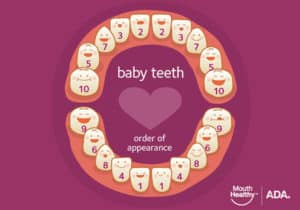Warning: Teething Jewelry May Pose Significant Risk
You may have seen it advertised in women’s magazines or on parenting blogs, cute jewelry marketed as a way for moms to look stylish while caring for a teething tot. But the U.S. Food and Drug Administration is warning that the jewelry may present a serious choking hazard or strangulation risk.

“Teething jewelry includes necklaces, bracelets, and other jewelry that can be worn by either an adult or child, and is often marketed to relieve an infant’s teething pain,” states the FDA’s safety warning. “The beads of the jewelry may be made with various materials such as amber, wood, marble, or silicone. Jewelry marketed for teething pain is not the same as teething rings or teethers, which are made of hard plastic or rubber, and are not worn by an adult or child.”
The American Dental Association has joined the FDA in cautioning parents and caregivers that the jewelry has not been proven safe or effective. The FDA received a report of a 7-month-old child who choked on the beats of a wooden teething bracelet while under parental supervision. An 18-month-old child strangled to death when his amber teething necklace became wrapped around his neck during a nap.
“Teething jewelry may also be used by people with special needs, such as autism or attention-deficit/hyperactivity disorder (ADHD), to provide sensory stimulation or redirect chewing on clothes or body parts,” the FDA safety warning also states.
The jewelry poses similar risks of choking, strangulation, injury to the mouth, and infection for these people.
Instead of using teething jewelry to treat teething pain, parents and caregivers should adhere to the American Academy of Pediatrics’ recommendations. Teething typically begins between ages 4 to 7 months and may cause mild irritability, crying, a low-grade fever, excessive drooling, and a tendency to chew on things.
- Try gently rubbing or massaging the gums with one of your fingers, a small cool spoon, or a moist gauze pad
- Teething rings are helpful, too, but they should be made of firm rubber. Teethers that are to be frozen tend to get too hard and can cause more harm than good. Never allow an infant to use a teether that is frozen solid. Either simply chill them in the refrigerator or allow them to thaw to the point you can easily squeeze the contents around. Be warned that liquid-filled rings or other objects may crack and leak.
- Pain relievers and topical medications applied to the gums are not necessary or useful since they wash out of a baby’s mouth within minutes.
- Stay away from teething tablets that contain the plant poison belladonna and gels with benzocaine. Belladonna and benzocaine are marketed to numb your child’s pain, but the FDA has issued warnings against both due to potential side effects.
- If your child seems particularly miserable or has a fever higher than 101 degrees Fahrenheit (38.3 degrees Celsius), it’s most likely not a result of teething pain. Consult your pediatrician.
- When your child’s baby teeth have begun to come in, gently brush them with a soft child’s toothbrush. To prevent cavities, never let your baby fall asleep with a bottle, either at nap time or at night. By avoiding this situation, you’ll keep milk from pooling around the teeth and creating a breeding ground for decay.
Baby teeth are important to your child’s health because they form the foundation for chewing, speaking, and smiling. If a baby tooth is lost too early, permanent teeth can drift into the empty space, making it harder for other adult teeth to erupt. This process contributes to crooked and crowded teeth in later years.
Your child’s first dental visit should come after their first baby tooth has emerged but before their first birthday.
If you have questions about your child’s oral health, contact Carolina’s Dental Choice so that we can help you address any concerns. Visit us at carolinasdentalchoice.com to schedule an appointment or call us at 704.289.9519.
